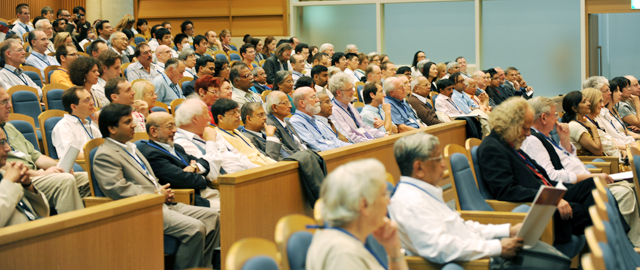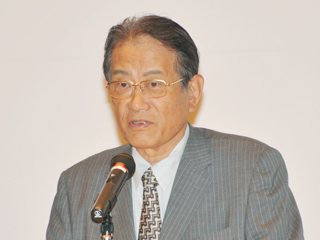第25代総長 松本 紘

スヴァー・ガタム(「ようこそいらっしゃいました」)
Ladies and gentlemen, distinguished guests and esteemed scholars from around the world.
アヌ・グリヒートー・スミ、パンディターハ! バヴァターム アビャーガマネーナ、(「ご来訪いただき光栄に存じます。研究者の皆様!」)
It is a real pleasure and privilege for me to participate in this opening ceremony of the 14th World Sanskrit Conference. As president of Kyoto University, I am very proud to have been given the honor of addressing a welcome speech to the eminent scholars in this Conference.
First of all, I would like to thank all of you for selecting Kyoto University as the venue of the World Sanskrit Conference. The secretariat of this Conference says this is the first World Sanskrit Conference to be held in East Asia, and actually the very first Conference in Asia except for India, in which this Conference started 37 years ago.
Let me take this opportunity to introduce the city of Kyoto and Kyoto University to you briefly.
 With a history of more than 1200 years as Japan's capital, Kyoto is endowed with an impressive legacy of traditional Japanese culture, including ancient Buddhist temples, Shinto shrines, refined places and gardens of every size and description, not to mention an enormous amount of country's most important works of art. You will find a deep influence of Indian culture almost everywhere in Buddhist temples and other historic sites in Kyoto. Japan, above all Kyoto and Nara, two former capitals of Japan, in fact mark the Far-eastern periphery of the great Indian civilization. Despite the geographical distance, India and Japan thus have entertained close cultural relations for a long time. The atmosphere of Kyoto University is indebted to this special cultural background of Kyoto city.
With a history of more than 1200 years as Japan's capital, Kyoto is endowed with an impressive legacy of traditional Japanese culture, including ancient Buddhist temples, Shinto shrines, refined places and gardens of every size and description, not to mention an enormous amount of country's most important works of art. You will find a deep influence of Indian culture almost everywhere in Buddhist temples and other historic sites in Kyoto. Japan, above all Kyoto and Nara, two former capitals of Japan, in fact mark the Far-eastern periphery of the great Indian civilization. Despite the geographical distance, India and Japan thus have entertained close cultural relations for a long time. The atmosphere of Kyoto University is indebted to this special cultural background of Kyoto city.
Kyoto University was established in 1897 as the second oldest national university in Japan, and, since then, has played a leading role in the country.
During the past century, the University has developed rapidly as a comprehensive university and is highly regarded today both within Japan and abroad as one of the most prestigious, large-scale research universities, which houses 10 departments, 17 graduate schools, 13 research institutes and 29 education and research centers and facilities. Currently, there are approximately 9,300 graduate and 13,400 undergraduate students, 2,900 faculty members and 2,500 administrative staff members.
An outstanding feature of our University's academic tradition is a mutual respect to the freedom and independence in researches. The spirit has developed in the locus of Kyoto that is not much affected by the political turmoil in Tokyo, the capital of Japan, in the modern period. Researchers are vigorously pursuing original researches, on the basis of individual objectives and interests with this spirit and have produced significant results in a multitude of fields. Among our alumni and former staff members, our University has produced <seven> Nobel Prize laureates and <two> Fields Prize winners in the areas of fundamental natural sciences and mathematics.
In humanities and social sciences, Kyoto University has established unique international research centers that reflect philosophic traditions of Kyoto. Our approach to these fields is characterized by strict training of languages and wide historical perspectives. Various types of disciplines flourish and interact in the campus, ranging from classical philology to analysis of modern life. Active discussion and creative dialogue in our campus are rooted in the University's rich history of pioneering fieldworks and philological studies. Study of Sanskrit and Indian Philosophy is one of the fields, of which we are proud of international standard. I hear that Professor Masaaki Hattori will describe briefly the history of Sanskrit and Indological studies in Kyoto in his keynote speech after the opening ceremony.
I am sure this conference will provide a valuable opportunity for all participants from around the world to discuss subjects of mutual interest, enhance one's own knowledge, encourage exchange of opinions, stimulate new ideas, renew old friendships and make new acquaintances. I hope you all will have a pleasant, enjoyable and fruitful week in Kyoto, which was once called Hei-an-kyo, "the City of シャーンティヒ."
(シャーンティというのは「平安、平和、安寧」を意味します)。
Thank you.

